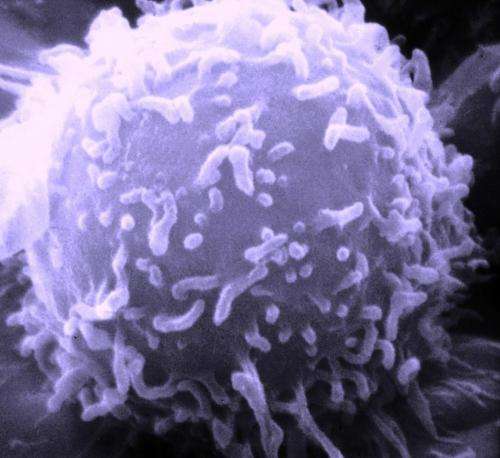Electron microscopic image of a single human lymphocyte. Credit: Dr. Triche National Cancer Institute
Existing chemotherapy approaches treat cancer by targeting cells that are actively multiplying and have a high metabolic rate. However, cancer stem cells can escape this targeting, leading to chemotherapy-resistant cancer and disease relapse. Researchers suspect that the microenvironment in which some cancer stem cells develop may give them protection from chemotherapy treatments.
In research described this week in the JCI, a team of researchers led by Trang Hoang at the University of Montreal determined that pre-leukemic stem cells were less sensitive to current chemotherapy drugs.
The team then developed a powerful screening method to identify drugs that more effectively target and kill these pre-cancerous cells.
They determined that pre-leukemic stem cells were dependent upon specific features in the bone marrow environment for survival.
By mimicking these features in a drug screening assay, the researchers were able to identify a compound called 2-methyoxyestradiol that reduced survival of pre-leukemic cells without affecting normal cells. Treatment with 2-methyoxyestradiol also reduced the development of leukemia in a mouse model.
The use of this and similar stem cell-targeted screening assays may lead to identification of novel approaches for treating chemotherapy-resistant and relapsed cancer.
More information: Bastien Gerby et al, High-throughput screening in niche-based assay identifies compounds to target preleukemic stem cells, Journal of Clinical Investigation (2016). DOI: 10.1172/JCI86489
Journal information: Journal of Clinical Investigation
Provided by JCI Journals






















